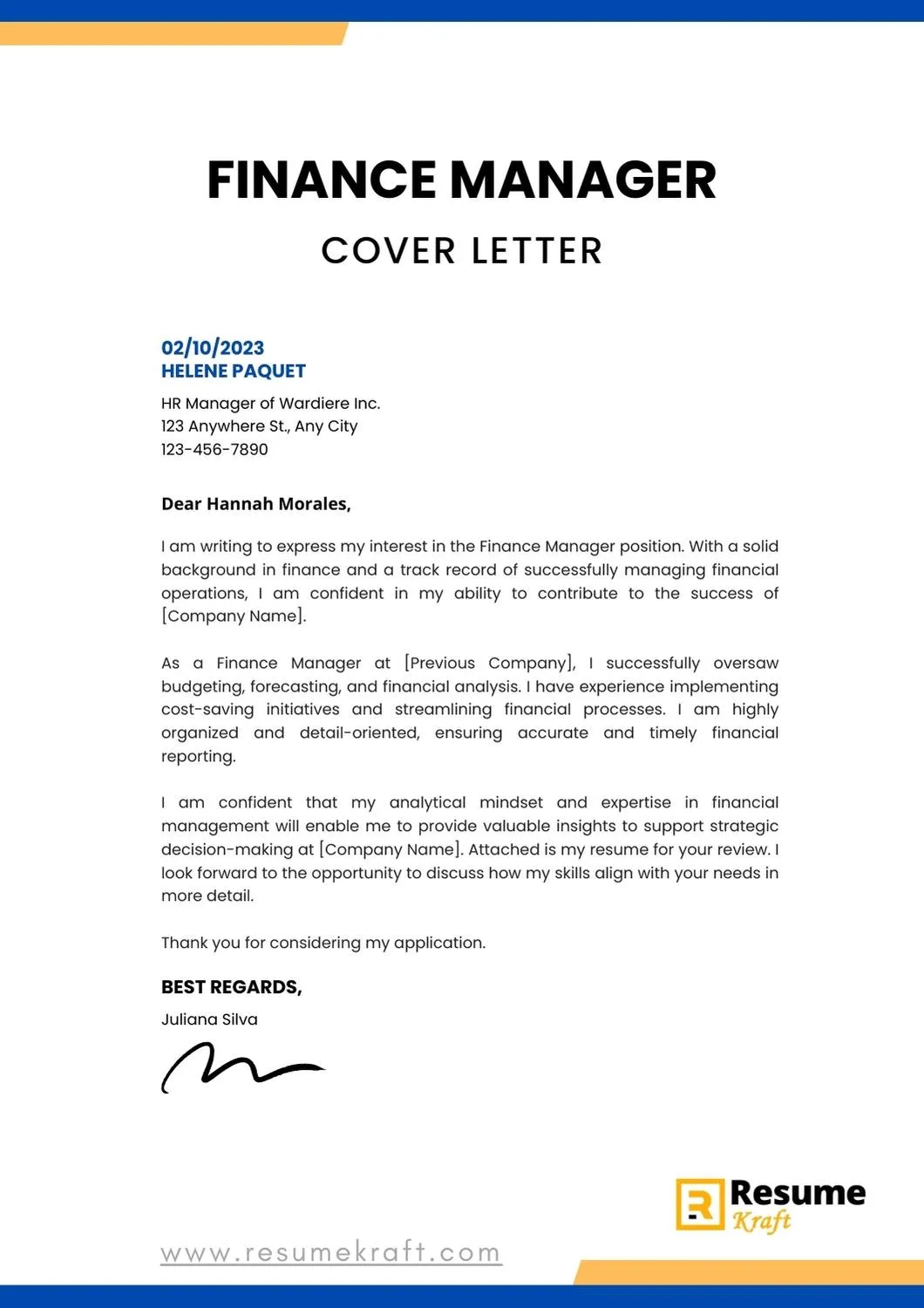What is a Finance Cover Letter?
A finance cover letter is a crucial document that accompanies your resume when applying for finance-related positions. It serves as your introduction to the hiring manager, providing an opportunity to showcase your skills, experience, and passion for the field. Unlike a resume, which provides a chronological overview of your work history, a cover letter allows you to tell a story, highlighting specific achievements and explaining why you are the ideal candidate. It’s your chance to make a strong first impression and persuade the employer to consider you for an interview. A well-crafted cover letter can significantly increase your chances of landing your dream finance job, while a poorly written one can be detrimental to your application.
Key Components of a Winning Finance Cover Letter
A compelling finance cover letter consists of several key components that work together to present you as a strong candidate. These elements are critical for capturing the hiring manager’s attention and demonstrating your suitability for the role. Each section plays a vital role in conveying your qualifications, enthusiasm, and understanding of the position. By mastering these components, you can create a cover letter that not only highlights your skills but also resonates with the employer, increasing your chances of securing an interview and ultimately, the job. The following sections provides a detailed guide to writing each component effectively.
Your Contact Information and the Date
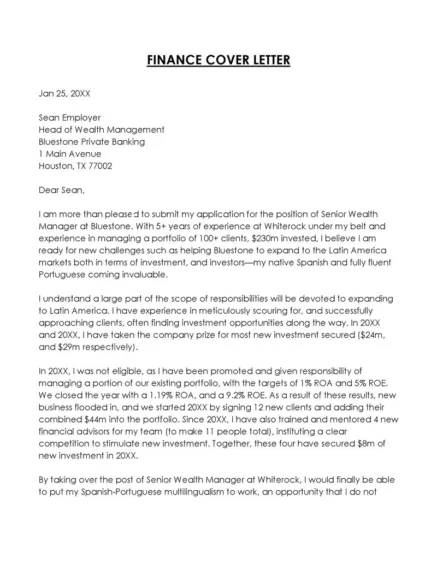
At the top of your cover letter, you should include your contact information. This typically includes your full name, phone number, email address, and optionally, your LinkedIn profile URL. Ensure this information is accurate and up-to-date. Below your contact information, include the date you are sending the cover letter. This allows the hiring manager to easily identify when the letter was written and keeps your application organized. This section sets the foundation for a professional presentation and ensures that the employer can easily reach you if they wish to move forward with your application. Be sure your email is professional, using your first and last name rather than a nickname.
Hiring Manager’s Contact Information
If possible, address your cover letter to a specific hiring manager or recruiter. Research the company and role to find the name of the person responsible for reviewing applications. Addressing the letter to a specific individual personalizes your application and demonstrates that you’ve taken the time to research the company. If you’re unable to find a specific name, using a title such as ‘Hiring Manager’ or ‘Recruiting Team’ is acceptable. This shows that you are attentive and that you care about the position you’re applying for. Personalization, when done correctly, can make a big difference in your application. It shows initiative and attention to detail, which are highly valued qualities in the finance industry.
Professional Salutation
Start your cover letter with a professional salutation. If you know the hiring manager’s name, use ‘Dear Mr./Ms./Mx. [Last Name]’. If you do not know the name, use a general greeting such as ‘Dear Hiring Manager’ or ‘Dear Recruiting Team’. Avoid casual greetings like ‘Hi’ or ‘Hello’ as they may come across as unprofessional. A well-chosen salutation sets the tone for the rest of the cover letter and indicates your professionalism and respect for the recipient. Ensure you spell the recipient’s name correctly. Incorrect spelling can make you look careless, so always double-check your spelling before submitting your application. A professional salutation gives you a better chance to make a good impression.
The Opening Paragraph Grab Attention
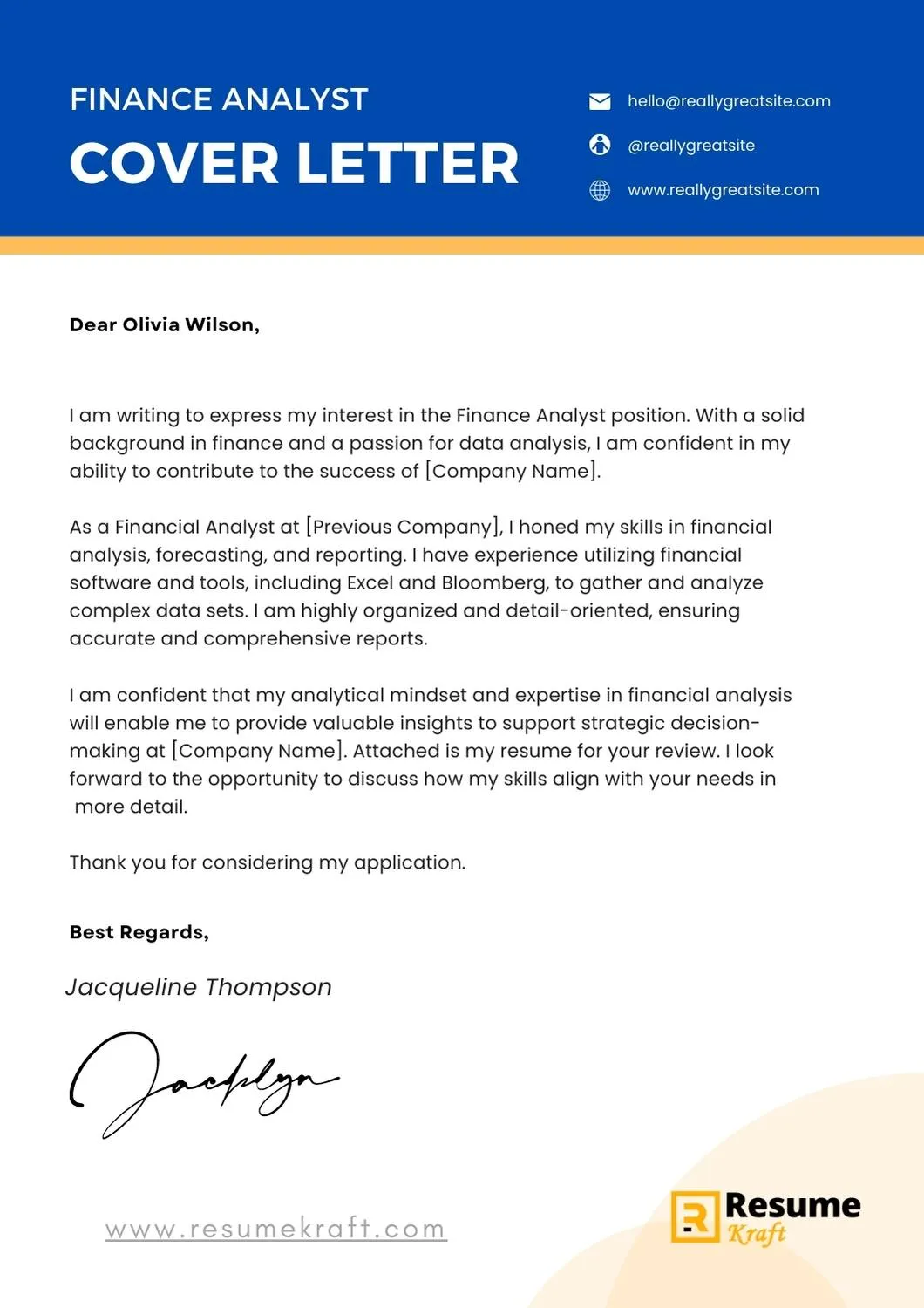
Your opening paragraph is your opportunity to make a strong first impression. Begin with a concise and compelling statement that immediately grabs the hiring manager’s attention. State the position you are applying for and where you saw the job posting. Briefly mention your most relevant skills or experience and express your enthusiasm for the role and the company. Avoid generic opening lines. Instead, aim to pique the reader’s interest by highlighting something unique about yourself or your qualifications. This will set the stage for the rest of your cover letter and encourage the hiring manager to continue reading. This initial impression is crucial, so make it count by clearly demonstrating that you understand the role and the company’s needs.
Highlighting Your Skills and Experience
In the body of your cover letter, highlight your most relevant skills and experiences. Carefully review the job description and identify the key qualifications the employer is seeking. Provide specific examples from your work history or education that demonstrate you possess those skills. Tailor your content to the specific requirements of the role, showcasing how your abilities align with the company’s needs. Use action verbs to describe your accomplishments and responsibilities. Focus on the most important points, avoiding the temptation to include everything from your resume. The goal is to provide a compelling narrative that showcases your value and positions you as a great fit for the job. Ensure that you provide evidence of how your skills have led to positive outcomes.
Quantify Your Achievements with Numbers
Whenever possible, quantify your achievements with numbers and data. Instead of simply stating that you improved efficiency, specify by how much. Instead of saying you managed projects, state the size and scope of the projects you handled. Using concrete numbers provides objective evidence of your accomplishments and helps the hiring manager understand the impact you’ve made in previous roles. For instance, mention the percentage by which you reduced costs, the amount by which you increased revenue, or the number of projects you successfully completed. Providing measurable results makes your claims more credible and demonstrates your ability to deliver tangible results in the finance sector. Quantifiable achievements quickly grab the attention of hiring managers.
Tailoring Your Cover Letter
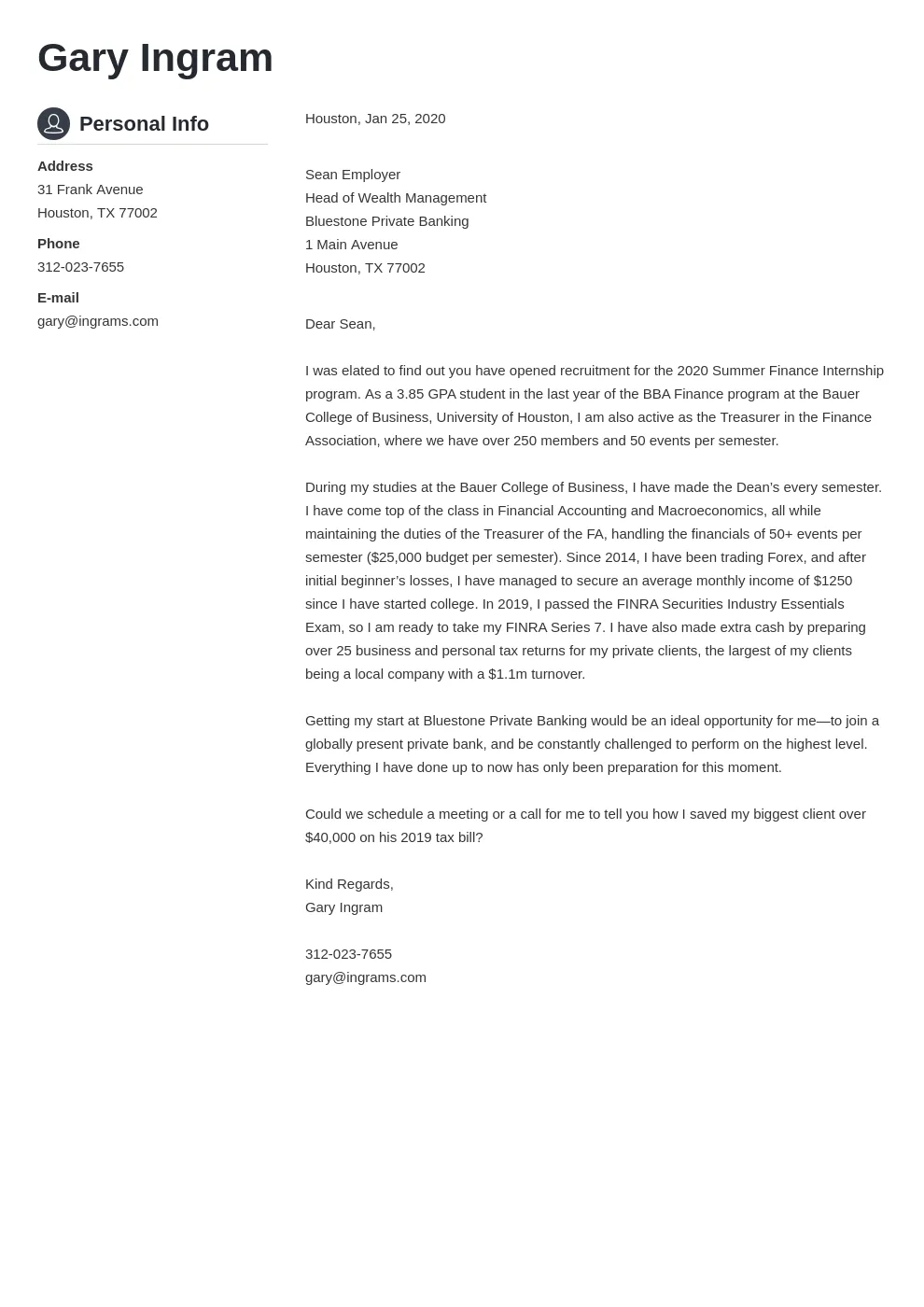
Customize each cover letter to the specific job and company. Generic cover letters that are sent to multiple employers often lack impact. Research the company’s values, mission, and recent activities to demonstrate your genuine interest. Highlight how your skills and experiences align with the specific requirements of the role. Mention specific aspects of the company that appeal to you, showing that you have invested time and effort into understanding their business. By tailoring your cover letter, you show that you’re seriously interested in the position and that you understand the company’s needs. This customization significantly increases your chances of getting your application noticed. The effort to tailor the letter demonstrates you are not just sending a generic application.
Show Your Passion for Finance
Demonstrate your passion for the field of finance. Explain what interests you about finance and why you are drawn to this career path. This could involve discussing specific financial markets, investment strategies, or accounting principles that fascinate you. Show that you stay updated on industry trends and have a genuine interest in the company’s work. Discuss any relevant certifications, coursework, or professional development activities that indicate your commitment to the finance sector. Displaying your enthusiasm for finance helps the hiring manager see beyond your skills and understand your motivation. A passionate candidate is more likely to stay engaged and contribute positively to the company. Let your enthusiasm shine through.
Expressing Your Interest and Enthusiasm
In your cover letter, make sure to express your interest and enthusiasm for the position and the company. Let the hiring manager know why you are excited about this specific opportunity. Highlight what attracts you to the company, whether it’s their reputation, their values, or their innovative approach to finance. Convey your eagerness to contribute to their team and achieve their goals. Use positive and enthusiastic language to create a favorable impression. Showing genuine excitement not only makes your cover letter more engaging, but it also signals that you are motivated to succeed and eager to become a part of the team. Expressing your enthusiasm distinguishes you from other candidates and leaves a lasting impression.
Call to Action Requesting an Interview
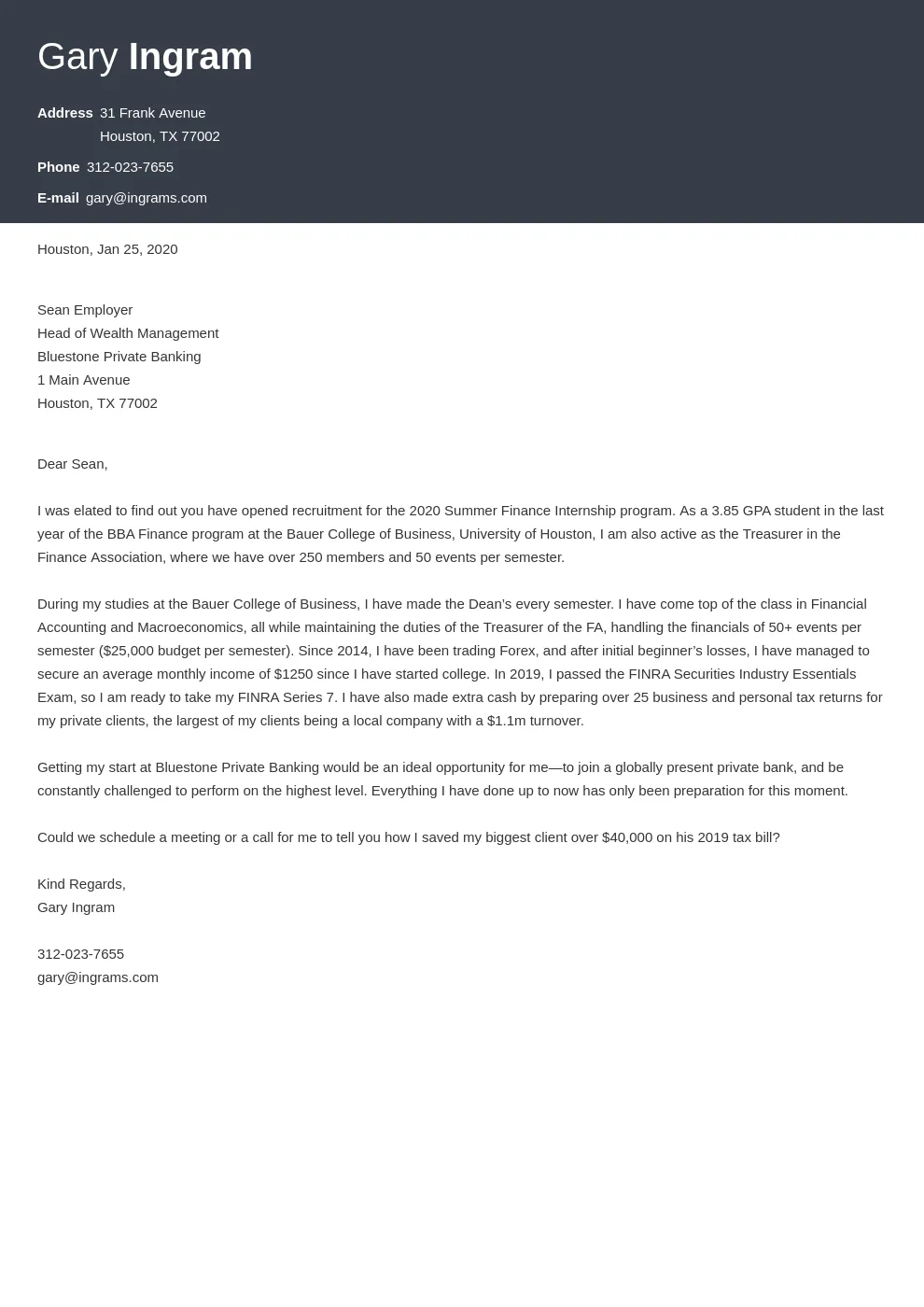
Include a clear call to action in your cover letter. State that you are eager to discuss your qualifications in more detail and request an interview. Make it easy for the hiring manager to contact you by reiterating your contact information. Thank the hiring manager for their time and consideration. A clear call to action leaves no doubt about your interest and your next steps in the application process. It also encourages the hiring manager to take action and consider your application further. A strong closing with a call to action ensures that the hiring manager knows your expectations and facilitates the next phase of the hiring process. Make sure that you are ready for the interview by preparing a set of questions.
Closing the Cover Letter
Close your cover letter with a professional closing, such as ‘Sincerely,’ ‘Best regards,’ or ‘Thank you.’ Be sure to include your typed name below your closing. If you are submitting a hard copy, sign your name above your typed name. Ensure the closing matches the tone of your cover letter, maintaining a professional and courteous manner. This final touch reinforces your professionalism and leaves a positive impression with the hiring manager. A well-crafted closing is as important as the beginning of the letter, as it signals the end of your message and leaves a lasting impression. Pay close attention to details and create a strong finishing touch.
Cover Letter Examples for Different Finance Roles
Different finance roles require tailored cover letters. Each of the following examples provide a detailed guide. Here are cover letter examples for several finance roles, showing how to tailor your letter to specific positions and highlight the most relevant skills.
Financial Analyst Cover Letter Example
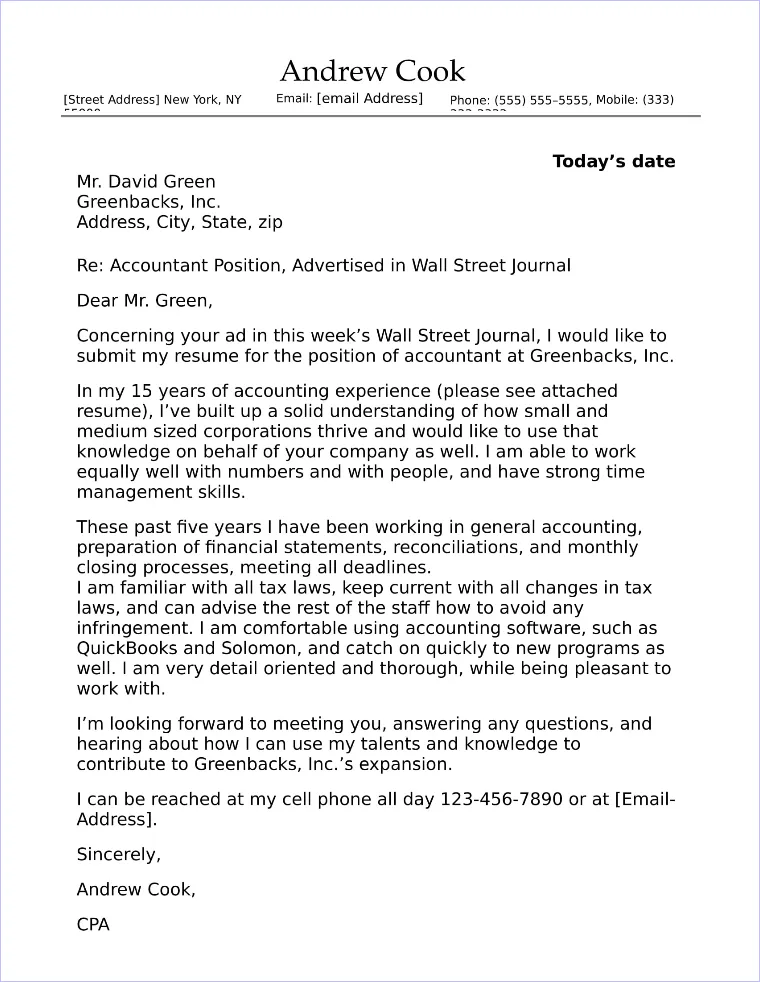
For a financial analyst position, emphasize your analytical skills, proficiency in financial modeling, and experience with financial statements. Highlight your ability to analyze data, make recommendations, and contribute to financial planning and forecasting. Mention your experience with relevant software such as Excel, and any certifications or coursework that are relevant to the role. Show your understanding of financial analysis and its importance to the company’s success.
Here is an example of what a financial analyst cover letter might look like:
Dear [Hiring Manager Name],
I am writing to express my interest in the Financial Analyst position at [Company Name], as advertised on [Platform]. With my [Number] years of experience in financial analysis and my strong analytical abilities, I am confident that I can make a significant contribution to your team.
In my previous role at [Previous Company], I was responsible for [responsibilities]. I have a proven track record of developing and maintaining financial models, conducting variance analysis, and preparing financial reports. For example, I was able to reduce costs by [percentage] by [actions]. I am proficient in [relevant skills, e.g. Excel, SQL, etc.]. I am also certified in [relevant certifications].
I am particularly drawn to [Company Name]’s [specific aspects of the company, e.g., values, products, etc.]. I am eager to apply my skills to contribute to your continued success. I am confident in my ability to analyze data, provide recommendations, and contribute to the strategic planning of [Company Name].
Thank you for your time and consideration. I have attached my resume for your review and look forward to the opportunity to discuss my qualifications in further detail.
Sincerely,
[Your Name]
Accountant Cover Letter Example
An accountant cover letter should focus on your knowledge of accounting principles, experience with financial reporting, and proficiency in accounting software. Highlight your attention to detail, accuracy, and ability to manage financial records. Demonstrate your knowledge of GAAP or IFRS. Showcase your understanding of accounts payable, accounts receivable, and other key accounting functions. Ensure your cover letter conveys your accuracy and diligence.
Here is an example of what an accountant cover letter might look like:
Dear [Hiring Manager Name],
I am writing to express my interest in the Accountant position at [Company Name], as advertised on [Platform]. With my [Number] years of experience in accounting and my strong knowledge of financial principles, I am confident that I can contribute to your team.
In my previous role at [Previous Company], I was responsible for [responsibilities]. I have a proven track record of preparing financial statements, managing accounts payable and receivable, and ensuring compliance with accounting standards. For example, I successfully streamlined the month-end closing process, reducing processing time by [percentage]. I am proficient in [relevant skills, e.g., QuickBooks, SAP, etc.]. I am also certified in [relevant certifications, e.g., CPA].
I am particularly drawn to [Company Name]’s [specific aspects of the company, e.g., culture, values, etc.]. I am excited about the opportunity to utilize my skills and experience to contribute to your financial success. I am eager to work in a dynamic and challenging environment and help [Company Name] achieve its goals.
Thank you for your time and consideration. I have attached my resume for your review and welcome the chance to discuss my qualifications in more detail.
Sincerely,
[Your Name]
Financial Controller Cover Letter Example
For a Financial Controller position, emphasize your leadership abilities, strategic financial planning skills, and experience in financial management. Highlight your ability to oversee financial operations, manage budgets, and ensure compliance with financial regulations. Showcase your understanding of financial risk management and your ability to improve financial performance. Quantify your experience and achievements to demonstrate your competence.
Here is an example of what a financial controller cover letter might look like:
Dear [Hiring Manager Name],
I am writing to express my interest in the Financial Controller position at [Company Name], as advertised on [Platform]. With my extensive experience in financial management and my proven leadership abilities, I am confident that I can excel in this role.
In my previous role at [Previous Company], I was responsible for [responsibilities]. I have a proven track record of managing financial operations, developing and implementing financial strategies, and ensuring compliance with financial regulations. For example, I improved operational efficiency by [percentage], resulting in [positive outcomes]. I am proficient in [relevant skills, e.g., financial modeling, risk management, etc.]. I am also certified in [relevant certifications, e.g., CPA, CMA].
I am particularly drawn to [Company Name]’s [specific aspects of the company, e.g., industry, values, etc.]. I am eager to contribute my expertise to help [Company Name] achieve its financial goals and drive sustainable growth. I am enthusiastic about leading and managing a high-performing finance team.
Thank you for your time and consideration. I have attached my resume for your review and look forward to the opportunity to discuss my qualifications in further detail.
Sincerely,
[Your Name]
Investment Banker Cover Letter Example
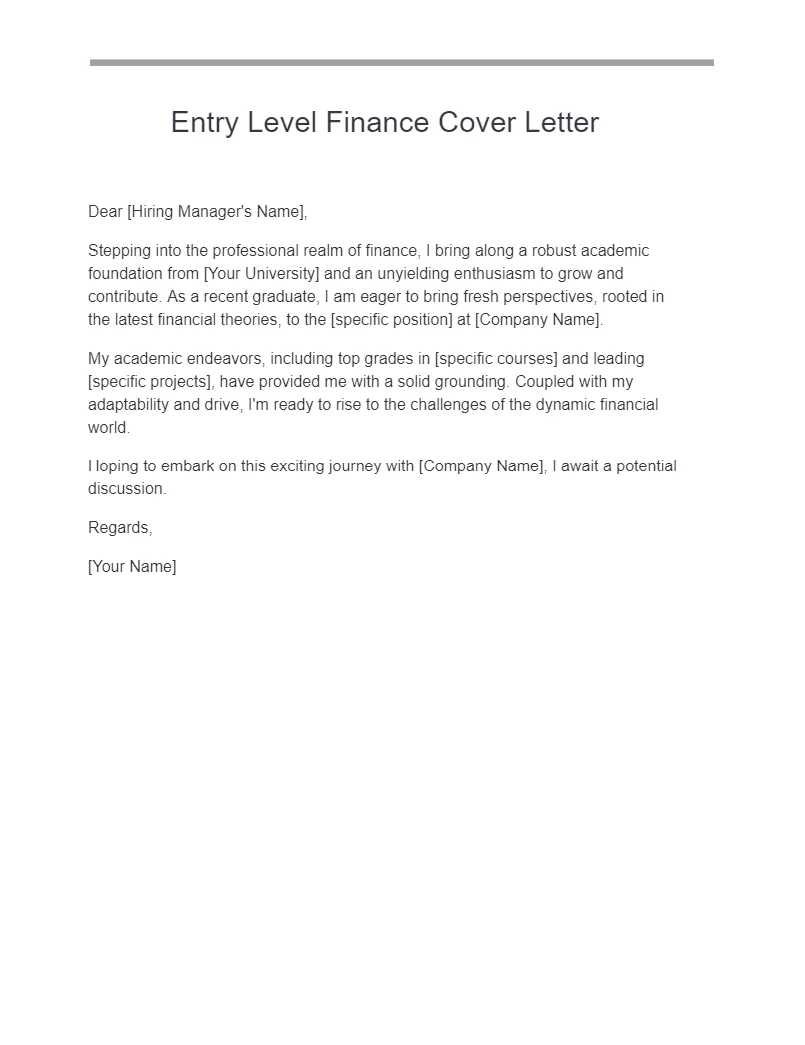
An investment banker cover letter should highlight your understanding of financial markets, your experience in deal structuring, and your ability to build relationships. Showcase your analytical skills, your knowledge of valuation techniques, and your ability to work under pressure. Mention any experience with mergers and acquisitions, equity offerings, or debt financing. Stress your ability to advise clients and close deals, and your familiarity with industry trends.
Here is an example of what an investment banker cover letter might look like:
Dear [Hiring Manager Name],
I am writing to express my interest in the Investment Banking position at [Company Name], as advertised on [Platform]. With my strong understanding of financial markets and my experience in deal structuring, I am confident that I can contribute to the success of your team.
In my previous role at [Previous Company], I was responsible for [responsibilities]. I have a proven track record of leading and supporting successful transactions. For example, I assisted in closing deals valued at over $[amount], demonstrating my ability to negotiate terms and manage complex financial transactions. I am proficient in [relevant skills, e.g., financial modeling, valuation, etc.]. I am also certified in [relevant certifications, e.g., Series 7, Series 63].
I am particularly drawn to [Company Name]’s [specific aspects of the company, e.g., reputation, deals, etc.]. I am eager to leverage my skills and experience to contribute to your continued growth and success in the investment banking sector. I am also dedicated to building client relationships and delivering exceptional results.
Thank you for your time and consideration. I have attached my resume for your review and welcome the opportunity to discuss my qualifications in further detail.
Sincerely,
[Your Name]
Tips for a Perfect Finance Cover Letter
Writing a perfect finance cover letter requires attention to detail and adherence to best practices. Follow these tips to enhance your cover letter and increase your chances of making a positive impression on the hiring manager. This includes proofreading, professional tone, proper formatting, and company research. Implementing these tips will increase your chance of a high-quality letter. Remember that a well-crafted cover letter will make your application stand out from the competition. Take the time to perfect your letter, and it will pay off. A cover letter is your chance to sell yourself and showcase your expertise, and these tips will help you do just that.
Proofread and Edit Carefully
Proofreading and editing are essential steps in the writing process. Before submitting your cover letter, carefully proofread it for any grammatical errors, spelling mistakes, and typos. Ensure that your sentences are clear, concise, and well-structured. Use a grammar checker to help identify errors, but also read the letter aloud to catch awkward phrasing. Ask a friend, colleague, or career advisor to review your cover letter as a second pair of eyes can often catch mistakes you might miss. A polished and error-free cover letter shows professionalism and attention to detail, which are crucial in the finance industry. Proofreading helps your application shine. Don’t let small errors ruin your chances of landing your dream job.
Use a Professional Tone
Maintain a professional and formal tone throughout your cover letter. Avoid using slang, jargon, or overly casual language. Write in a clear and concise manner, using formal sentence structures and avoiding contractions. Use appropriate vocabulary that is relevant to the finance industry. Keep your tone respectful and polite, even if you are expressing strong opinions or highlighting specific achievements. Remember that a cover letter represents you and your professional brand. A well-written, professional cover letter is essential for projecting a polished and credible image. Using a professional tone ensures you convey your level of competence and seriousness about the opportunity.
Format Your Cover Letter Properly
Proper formatting is essential for a professional-looking cover letter. Ensure that your cover letter is easy to read and visually appealing. Use a clear and readable font, such as Times New Roman or Arial, with a standard font size (11 or 12 points). Include adequate white space by using margins of at least one inch on all sides. Left-align your text and use single-spacing within paragraphs and double-spacing between paragraphs. Avoid distracting design elements or excessive formatting, as this can detract from your message. Proper formatting makes your cover letter easier to read and increases its impact. Presenting your information in a clean, organized format will give you a professional edge.
Research the Company
Before writing your cover letter, research the company you are applying to. Understand their mission, values, and recent activities. Visit the company’s website, read their press releases, and check their social media profiles. Show your genuine interest by mentioning the company’s accomplishments, their values, and how they align with your career goals. Demonstrate that you understand their industry, their challenges, and how you can contribute to their success. Researching the company allows you to tailor your cover letter to their specific needs and requirements, showcasing your enthusiasm and attention to detail. Showing genuine interest can set you apart from other candidates and can make your cover letter more compelling and successful. This extra effort will let you make a great first impression.
Common Mistakes to Avoid
Avoiding common mistakes is vital for a successful cover letter. Here are some common pitfalls to avoid when writing a finance cover letter. From repeating your resume to using generic language, these mistakes can make your application less effective. By avoiding these errors, you can ensure that your cover letter stands out and makes a strong impression on hiring managers. Making sure you’re not making these mistakes can make a big difference in your application.
Don’t Simply Repeat Your Resume
Avoid simply repeating information from your resume in your cover letter. The cover letter should complement your resume, providing additional context and highlighting specific achievements that align with the job requirements. Use the cover letter to tell a story, expanding on your skills, experiences, and qualifications in a more narrative format. While you can reference your resume, the cover letter should offer a deeper insight into your professional background and your motivation for applying. Your cover letter should elaborate on the most relevant aspects of your qualifications and show how you can contribute value to the company. Avoid creating a duplicate document, and instead, use your cover letter to create a unique narrative.
Avoid Generic Language
Avoid using generic, cliché phrases and language that could apply to any job. Avoid phrases such as ‘I am a hard worker,’ ‘I am a team player,’ or ‘I am detail-oriented.’ Instead, provide specific examples that demonstrate these qualities. Use concrete language to showcase your accomplishments and highlight your skills in a way that is relevant to the job and the company. The goal is to make your cover letter unique and memorable by tailoring your content to the specific role and company. Replacing generic language with specific and tailored examples will make your cover letter more effective and engaging. By speaking specifically about your abilities, you make your cover letter more effective.
Don’t Exceed One Page
Keep your cover letter concise and to the point. Aim for a one-page length. Hiring managers often review many applications, and a lengthy cover letter may not be read in its entirety. Focus on the most relevant information and prioritize quality over quantity. Organize your thoughts clearly and write in a way that is easy to read and understand. Be selective about what you include and eliminate any unnecessary details. The goal is to present your key qualifications effectively without overwhelming the reader. A concise cover letter shows you value the reader’s time. Presenting your most important information is critical to your success.
Formatting and Design Tips
Proper formatting and design can significantly improve the readability and visual appeal of your cover letter. Following these formatting and design tips will improve your cover letter. Creating a visually appealing cover letter is key for attracting attention from hiring managers. Well-formatted and designed cover letters will demonstrate professionalism and competence, helping you stand out from other candidates. From font choices to appropriate spacing, these elements will improve the overall presentation of your application. The appearance of your cover letter is a crucial factor in making a strong first impression.
Font and Size
Choose a professional and easy-to-read font for your cover letter. Recommended fonts include Times New Roman, Arial, Calibri, or Helvetica. Use a font size between 11 and 12 points to ensure readability. Avoid using overly decorative or unusual fonts, as they can be distracting and make your cover letter appear unprofessional. The right font choice and size will make your cover letter easier to read. Select a font that is professional and easy on the eyes. Using a standard font ensures your content is accessible and makes a positive impression.
Margins and Spacing
Use standard margins of at least one inch on all sides of your cover letter. This creates sufficient white space and improves readability. Use single-spacing within paragraphs and double-spacing between paragraphs to separate sections and improve visual clarity. Properly formatted margins and spacing will make your cover letter look organized and professional. The use of white space is important for readability. Too little white space can make your cover letter difficult to read, while the right amount can significantly enhance the overall presentation.
Adding a Professional Touch
Include a professional header with your contact information at the top of the cover letter. Use a consistent style and format throughout the document. Proofread your cover letter carefully for any grammatical errors, spelling mistakes, or typos. Ensure your cover letter reflects your professionalism and attention to detail. The overall appearance of your cover letter should be clean, well-organized, and visually appealing. Adding a professional touch enhances your credibility. The formatting and design choices make your cover letter look more professional. Adding a professional touch can give you an edge over other applicants.
Where to Find Finance Cover Letter Templates
Several online resources provide finance cover letter templates. You can use these templates to structure your cover letter. Here are some reliable sources for finance cover letter templates, offering guidance and support to help you create a compelling cover letter. Finance cover letter templates make it easier to get started and organize your thoughts. Using these templates will help you quickly and efficiently produce a polished cover letter. Using finance cover letter templates will provide you with the structure and formatting needed to create an outstanding document and help you land an interview.
Some reliable resources include:
- Resume.io
- Indeed.com
- Zety.com
- CareerBuilder.com
